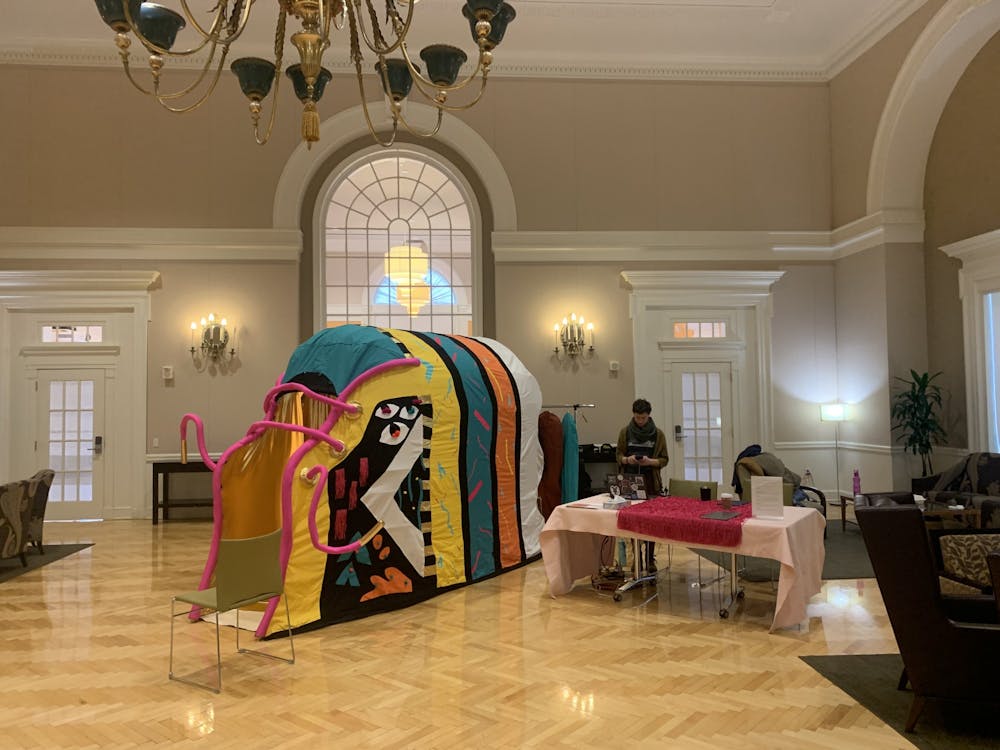The Walk in My Shoes Experience kicked off their six-stop national tour at Newcomb Hall Wednesday and Thursday as part of the University’s 2020 Community MLK Celebration. During the full-day events, students, faculty and community members were given the opportunity to walk in the shoes of a University student through an immersive audio and visual experience aimed at helping the community “take a stand.”
Presented as a giant colorful shoe, the experience allowed participants to step into the life of an unidentified second-year University student who identifies as black, female and queer. Co-founder Micah Kessel starts the experience by asking participants questions about their identity before they are led into the shoe and debriefs the experience with them afterwards.
Though the experience just arrived at the University, the Shoe’s journey began in 2018 when co-founder Kelley Van Dilla, a design specialist, and Kessel, a filmmaker, met and created their concept. They then brought the concept to Dr. Lisa Feldman Barrett, a psychology professor at Northeastern University, to further develop the emotional aspect of the experience, which presents as the thoughts and emotions of someone’s memories and experiences at a university.
“Part of our process getting here to U.Va. was being engaged to develop a specific profile of a current U.Va. student, and creating that profile was really just an exercise in empathy for myself and really inspired me — as a filmmaker and as a storyteller and as a designer,” Van Dilla said. “Today, we shared that profile with the person who it is based off of, and that was one of the most touching experiences that I've ever had in my life, and I think it's been equally touching for people to walk in her shoes.”
The time slots to participate in the experience filled up completely, leaving the experience team to run the immersive event both Wednesday and Thursday.
“It takes so much work to reenact someone's memories and find people to do that and put all that energy into creating these experiences,” Kessel said. “But then, after all that work, you're sharing the responses of people that have come to the experience, and the level of engagement that they bring, and interest and willingness to want to become part of a really good conversation — and to want to have everyone feel included and seen — is enormous.”
Despite its name, the experience requires participants to remove their shoes before entering the carefully crafted space where the bulk of the immersion takes place. In the shoe, participants are instructed to put on or examine a series of items valuable to the unidentified student, like clothing, jewelry and cosmetics, before the lights dim and a series of clips shown through the student’s eyes help participants empathize with the person they are getting to know.
“We want to be able to show how a giant sparkly shoe can change the way that U.Va. is talking about their differences — even change the way that the country is talking about our differences,” Kessel said.
In order to emphasize the experience’s impact, Kessler and Van Dilla are creating a video comprised of participants’ takeaways and sense of heightened awareness and empathy for the perspective presented in the experience and others like it.
“It's been my favorite part, as always, sharing it with visitors who come into the experience and getting to know people before, during and after they go through the show, and really seeing how people engage with someone that they may not have thought about before or thought about what their experiences are like,” Van Dilla said.
Before heading to their next stops in Boston at the Massachusetts General Hospital and Chicago at the Association for Psychological Sciences Convention and the American Medical Association conference, Kessel and Van Dilla hope to introduce the experience to as many departments as possible throughout the University.
Kessel noted that the University’s ability to address challenges such as its low ranking in social mobility is reliant upon an ability to exercise empathy.
“I think U.Va. has a great opportunity to step forward out of the problem of being in the bottom 15 percent of social mobility of colleges across the country and really take the next year to completely change that paradigm — I think it's possible,” Kessel said. “But it's going to require everyone looking at themselves and finding ways to think about the way that they're expressing themselves and the way that they're hearing others.”







